Ailsa Harvey
For many, breathing is an essential component in their method for remaining calm. But how do you keep composed when deep underwater with no oxygen, for up to seven minutes? How do you push yourself to your limit without going too far?
Freediving is a form of diving without the use of any breathing apparatus. Competitors can specialise in a range of disciplines in both deep diving and pool diving. I caught up with five British freedivers to find out why they chose this underwater sport and learn how they value safety in the sport.
Georgina Miller has been a member of the British freediving team since 2007, when she was 29 years old, and last year became the UK champion across six disciplines; static, dynamic and dynamic (no fins) in the pool and constant weight, constant no fins and free immersion in depth.*
Originally from Essex, the successful diver moved with her partner to Cornwall, which she describes as “one of the best places to dive in the UK”. There they have set up a freediving school together, called Aquacity Freediving.
“I have always been interested in the world underwater and used to practice swimming as deep or as far as I could”, Georgina explained. “I took a course in the end because while I was scuba diving, I saw a lady swim past us to a wreck in Thailand. I just thought I want to learn to do that!”
“It is the most amazing feeling being deep under water, immersed in the colour of the sea, listening to the sounds down there. It gives you a huge appreciation and respect for the amazing wilderness that we are in. I think a lot of deep freedivers feel in those moments below that you are at one with the ocean and it’s very peaceful.”
Britain’s Pool World Championship captain, Philip Fennell, also recalled the time he first encountered freediving. The 51-year-old said, “I was at the London Dive Show in 2000 when I came across the British Free Diving Association stand. [I] was totally captivated by the images of freedivers wearing nothing more than a mask, wetsuit and monofin. It looked so simple and elegant.”
But it was not just the simplicity that attracted Philip to the sport, as he said “the challenge of being a breath-hold diver appealed to [him] as much as the simplicity of it.”
Living in Oxfordshire, Philip has been taking training more seriously over the past four years, using the sport to improve his health. “I’d become overweight and unfit in my late forties and I needed to focus to get active and healthy again,” he said. “Taking up freediving, like many sports, has the ability to change you in fundamental and life enhancing ways.”
Competitors in freediving are always striving to improve their dive lengths and the control they can have over their body. Through practice and familiarity of the sensation freediving brings, it is possible to push yourself and your limits.
Philip said, “A static breath hold is all about relaxation and acceptance of how you feel. Many people use different forms of internal distraction to take them through the latter phases of the dive, as you begin experiencing an increasing urge to breathe.”
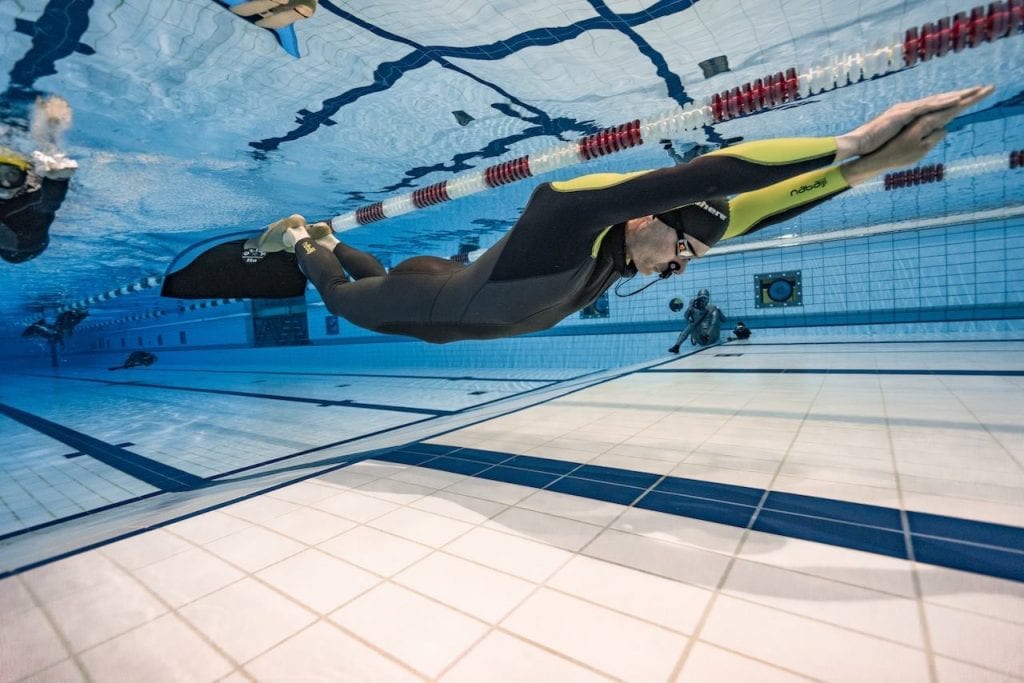
Philip Fennell freediving at the 2016 AIDA Individual Pool World Championships in Turku, Finland – Credit:Daan Verhoeven
While the pool divers are able to return to air relatively quickly, deep divers a hundred metres below the ocean’s surface need to allow time to safely re-emerge from the water.
Is freediving a dangerous sport?
Pushing your limits can be dangerous in freediving if you have not been trained by a knowledgeable instructor. Freedivers always dive with a ‘dive buddy’ to ensure extra safety. Buddies know each other’s limitations and can be crucial in the case of an emergency.
33-year-old Adam De La Mare is a full-time freediving instructor, and an expert in encouraging safety in the sport. Living in Menorca alongside his girlfriend, he partakes in freediving for personal enjoyment and to spread his passion onto students.
When he first discovered the sport, the instructor from London said he “wasn’t really doing a lot with [his] life and definitely wasn’t a sporty person.”
“I saw an advert for a TV show being made by Channel 4 and they were looking for volunteers to be tested in a range of skills”, he told me. “On the day of testing one of the skills was for equalisation and breath hold. I found out later they were testing for freediving.”
While he admitted his equalisation “wasn’t great”, Philip discovered his strengths in holding his breath. After being asked to return and encountering a similar problem when equalising, he made it no further in the recruitment process. However, this was only the beginning of Adam’s freediving journey. “By that point I was hooked”, he explained. “I joined my nearest club in London, NoTanx, and trained as much as I could.”
Pool diving vs Depth diving
Freediving is any underwater swim on a single breath, whether this be swimming horizontally across the length of the pool or vertically downwards into the depths of the marine world.
The team’s Pool World Championship captain, Philip, uses the controlled pool environment “to build up breath hold capacity and acquire better technique”. In practicing this discipline, he hopes to become more efficient and relaxed in the sport, using it as preparation for future depth dives.
With this being said, Philip added, “I really enjoy the dynamic disciplines in the pool. One of my favourite aspects is when you lose yourself in the action of a dynamic dive. It can be very peaceful, almost meditative.”
For Georgina, deep diving is on another level to diving in a pool: “I really prefer the deep diving. It’s far more interesting to me”, she said. “The pool is very useful for fitness and competition is fun, but the sea is just magical. Every dive is different, and it involves a greater awareness of yourself and your environment.
“I think it can be likened to the difference between walking on a treadmill in the gym and walking up a mountain. One helps the other but being in the real wilderness of the sea is mind blowing. Not always easy, but very charming.”
While her love of the sea cannot be denied, Georgina has displayed her talent in six different freediving disciplines and was the women’s UK national champion in 2017.
“It is pretty challenging to try and get points in all of them,” she said. “Many people specialise in pool or depth training rather than trying to do both. I think my score was 8th in the world in all six disciplines.”
Fellow British Freediver, Nancy Gibson, focuses her freediving on the depth discipline. The 36-year-old from Cornwall was selected onto the British team and competed in the 2017 depth World Championships.
Nancy began her freediving journey four years ago, coinciding with the emergence of the then-popular (and applicable) phrase, “You only live once”. However, she says that she has always loved challenging herself underwater.
“I never grew out of enjoying holding my breath, from being in the tub as a small child unnerving my mum or gran, to sitting by the side of the pool legs over the side and head submerged. I remember the ultimate luxury being going to a private pool, lying at the bottom and being engulfed by silence and weightlessness. I clearly remember that feeling of bliss.”
Nancy emphasised the importance of safety training as she recalled her early freediving experiences: “When I started, I found depth freediving so relaxing I’d take it really slowly to the point where I’d surface, and my lips would be blue. This is a sign of hypoxia rather than the cold, but since then I’ve improved my technique and awareness.”**
“I could never even touch the bottom of a pool”
For 39-year-old Beci Ryan, her freediving journey began when she discovered the possibility to do something that she had not previously been able to; to touch the bottom of the pool. Diagnosed with ear problems since childhood, doctors told Beci that she would never be able to freedive successfully. Years later, at the age of 25, she discovered her ears had cleared while on a trip to Thailand.
“it was the most amazing feeling,” Beci said describing her first experience. “I was hooked and wanted to carry on swimming under the water but without all the gear, so I googled freediving and to cut a long story short found a club in London”
Fourteen years later, Beci is a member of the UK pool team. Currently she is the highest scoring pool diver across three disciplines this year: Static, Dynamic and Dynamic (No Fins).
“I choose pool freediving because it’s much more accessible for me. But I do really enjoy the training and my results in competition have really benefited”, she explained.
Describing the feeling of freediving, Beci said, “I love the headspace it gives me. The silence underwater instantly calms me, and I love the gliding sensation which is kind of like flying. It’s also very much a team sport although not in an obvious or conventional way.”
“Freediving can feel like that bit in superhero movies where the hero is learning how to use his skills for the first time” – Adam
For some, freediving is about being stripped of all the gear and feeling the connection with marine life; being underwater without any equipment forces individuals to gain control of their own bodies in their new surroundings.
Nancy spoke of a freediving moment which gave her a first-hand insight into human impact on the underwater world. Describing it as a “scary moment”, she told me about her dive in Sardinia: “I was standing on the seabed at the end of the training line at around 25 metres enjoying the environment when this noise started. The experience was overwhelming. It vibrated every part of my being and I thought the world was about to implode.
“I came to my senses and made my way to the surface. It was a ship putting down its anchor in the bay. Partly why that is scary is because it’s such a seemingly innocuous everyday human action and so intrusive on the marine environment,” she explained.
Diving without danger
While some free divers will have encountered frightening incidents deep underwater, everyone I spoke to was keen to emphasize the fundamental importance for safety training when learning to freedive, as well as being in the right state of mind.
Adam recollected one of his dives, highlighting the importance of diving with a ‘buddy’. “I went with some freedivers who were exploring flooded underwater caves”, he began. “We had an incident where I thought I’d lost my buddy in a flooded tunnel, 3 hours trek underground. In dark, cold environments rescues can be almost impossible.”
In this incidence the diver was ok and they both made it safely back to the surface. “It shook me a lot and it’s definitely not an event I ever want to repeat. I was a long way outside my comfort zone”, he explained. Following this event Adam says he now has a much better understanding and control of the risks and how to manage them.
As the Chair Officer of the British Freediving Association, Georgina expressed how safety is the most important aspect of freediving.
“Taking a really progressive approach to it, and training with a good safety system in place means that it is not scary or risky, so it gives you the freedom to explore what you can do,” she told me. “It is a really gentle and safe sport when conducted properly, but incredibly dangerous when you are alone or untrained.”
“You have to accept that your next breath is at the surface” – Nancy
Philip expressed the importance of an individual’s thoughts while underwater: “You can become stressed during a dive if your focus shifts from being internal, being ‘in the moment’ as they like to say, to an external focus – you start thinking how far you have left to go. That is usually an indicator that your dive is over, and you need to return to the surface.
“To dive safely you must be aware of yourself and your surroundings. It is possible to dive beyond your limits without realising it, this is largely because our ability to make rational judgement deteriorates once we get low on oxygen.” Reflecting on personal experience, Philip continued, “In my early days of training I used to get carried away and worked towards attaining a distance rather than working to how I felt.”
Adam reinforced this point by adding: “Freediving is as much about knowing yourself and learning to dive within the limits of your focus and relaxation as it is about pushing them. And this applies to all levels of diver.”
“This sport has a lot to do with community”
Georgina says that while personal accomplishments are important to her, her proudest moments are often for other people. “When someone you have taught does well, or when my partner Daan makes some beautiful video or pictures that are published and go viral, or when someone sets a world record- that makes me proud to be a free diver,” she said. “This sport has a lot to do with community.”
Adam is also proud of others in the freediving community, as well as his own progression in the sport. He told me, “I’m very proud of a lot of the students I’ve taught and athletes I’ve coached and although it’s still early days, I’m very proud of setting up a freedive centre with my girlfriend.”
Speaking about the support of the community, Philip said, “What I love the most is the freediving community itself. They are all truly lovely people who are always happy to share their knowledge and help you develop your diving skills.”
For Philip, who used the sport to help improve his health, he added, “Freediving doesn’t require you to be super-fit to take part, but it opens up pathways that you can see how complementary activities, like changing diet and regular training/exercise, will support you in your progress. Learning relaxation techniques and how to deal with stress and improving flexibility through Yoga are all tools you can use to improve your diving and everyday life too. Freediving is a very transformative activity.”
Georgina also agreed with the additional benefits to the sport: “Freediving can benefit so many layers of day to day life, like learning to breathe and what it is to truly relax.
“It will keep you fit and healthy! There is a lot to do with it- it is not just about competition, it can be about wild life photography, exploration and is generally just amazing. The more you practice the more you will fall in love with the sport.”
The Future of Freediving..
For many athletes invested in freediving, they have expressed their passion in the simplest elements of the sport, but could an increase in its popularity adapt the fundamental features of the sport?
Philip said: “While I would like this sport to get more coverage, I hope freediving retains its simplicity and freedom. It shouldn’t try to change itself too much to meet the agenda of media companies and sponsorship deals that go hand-in-hand these days with greater coverage of sports on the world stage.”
Currently there are a limited number of athletes earning a living from competitive freediving. Adam hopes to see “a bit more professionalism” to help these numbers grow.
“Often organisers and athletes are hampered by funding as there isn’t a lot in the way of sponsorship and running freediving comps can be expensive,” he said. “It’s happening slowly with the advent of new underwater camera drones to cover depth competitions.”
“Hopefully with a bit more public interest, there will be more money through sponsorship and media coverage, so organisers can afford all the necessary aspects for a safe successful competition.”
Georgina agreed, and said, “I hope that freediving grows safely and with a high standard for instructors and the competitive side gains Olympic recognition in the near future.”
It is not all about the competitive aspect of the sport, as she continued to express her wishes for freediving to “become as popular as yoga [and for] people start to look at trying it at home in the UK. There is no need to go on trips abroad when we have such an amazing environment at home”
Beci is also keen to see shared knowledge of her sport. “I hope it continues to grow and that the education side of things flourishes, and the things learnt are shared openly”, she explained. “I hope it maintains its special uniqueness as it grows.”
For those wary of the sport and the danger often associated, Nancy would like people to appreciate the natural side of the activity as she looks to the future: “I’d love for freediving to be perceived as part of what makes us human rather than an extreme sport. We all have the mammalian dive response and that’s what your body taps into when breath hold diving.”
While it is unclear how further coverage and sponsorship could adapt the current state of the sport, for all of the freedivers I spoke to, it is more than just a competition. For successful progression in the sport, many hope that knowledge of freediving can continue to grow, while it retains its core attributes for all to enjoy; “experience, exploration and enjoyment”.
*Static apnea is a pool discipline in which the competitor holds their breath underwater for as long as possible. They are not required to swim any distance.
Dynamic pool freediving involves the divers swim underwater while holding breath and travelling horizontally. This event can either be with or without fins.
Constant weight freediving is a depth category which involves the competitor descending and ascending without the use of a rope. They can use two fins or one monofin.
Free Immersion is a discipline of depth diving in which a rope in used by the diver to pull themselves in descent and ascent.
**Hypoxia is a condition in which the body is significantly deprived of oxygen, affecting the function of the brain. This condition can occur in freediving when divers do not know their limits, and can lead to hypoxic blackout.
To find out more from British Freediving, head to their website: www.britishfreediving.org
For more information on Georgina and Daan’s freediving school (Cornwall), visit the Aquacity Freediving website: http://www.aquacityfreediving.com/
Learn more about NoTanx freediving club (London) by visiting their website: http://www.notanx.com
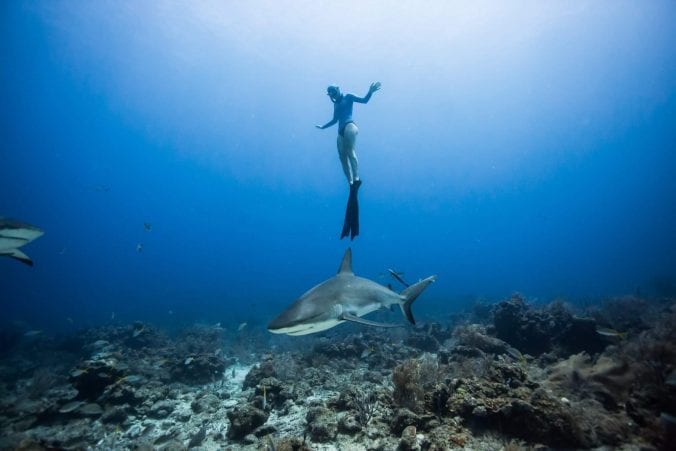
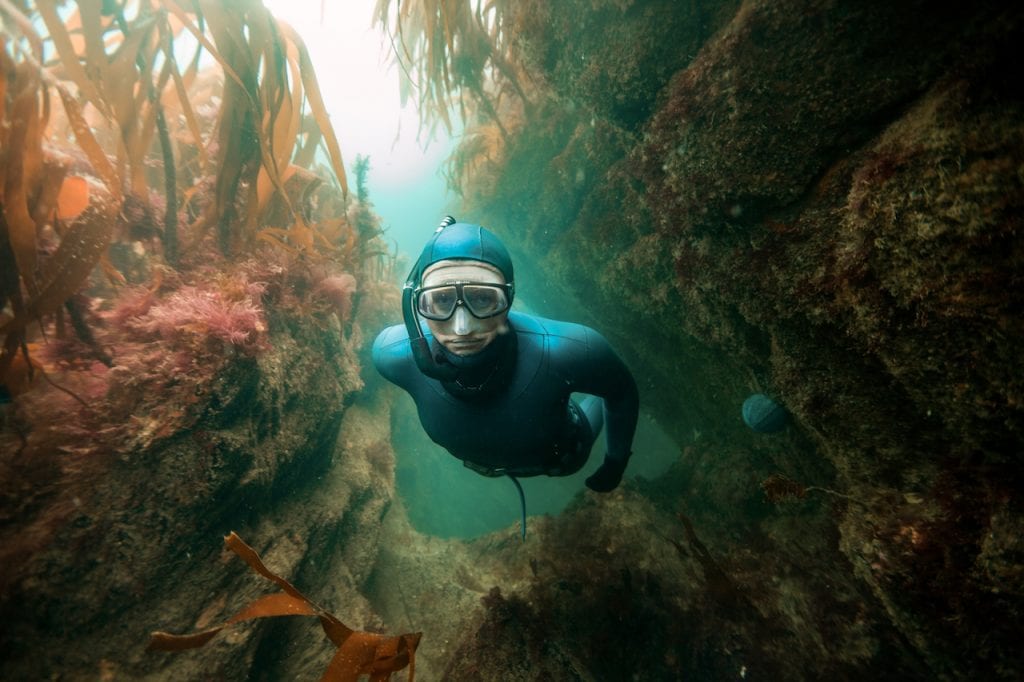
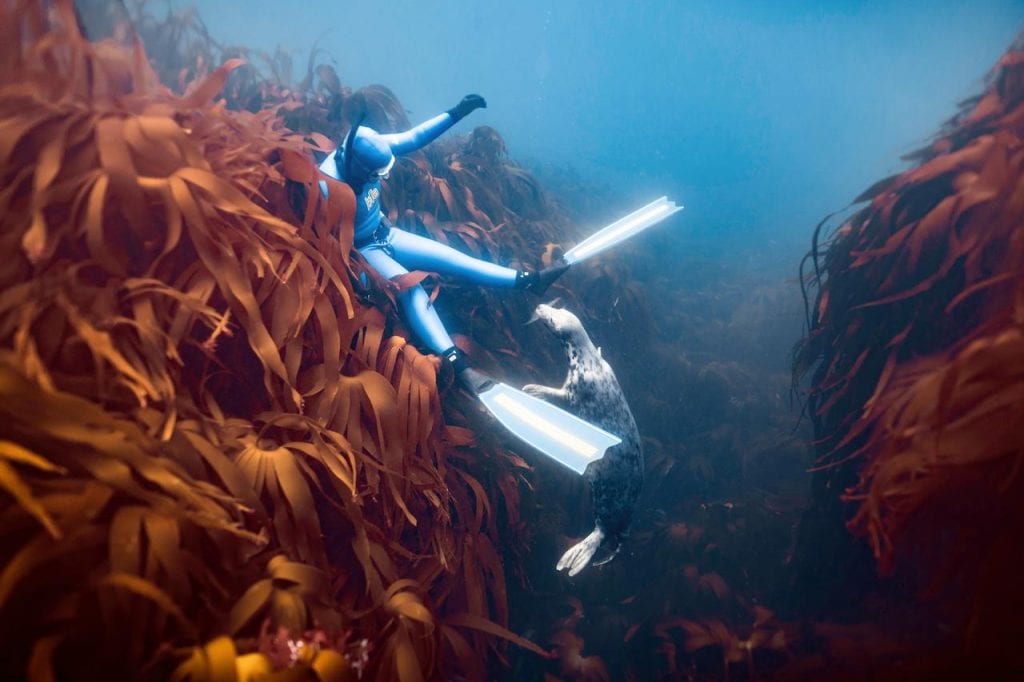
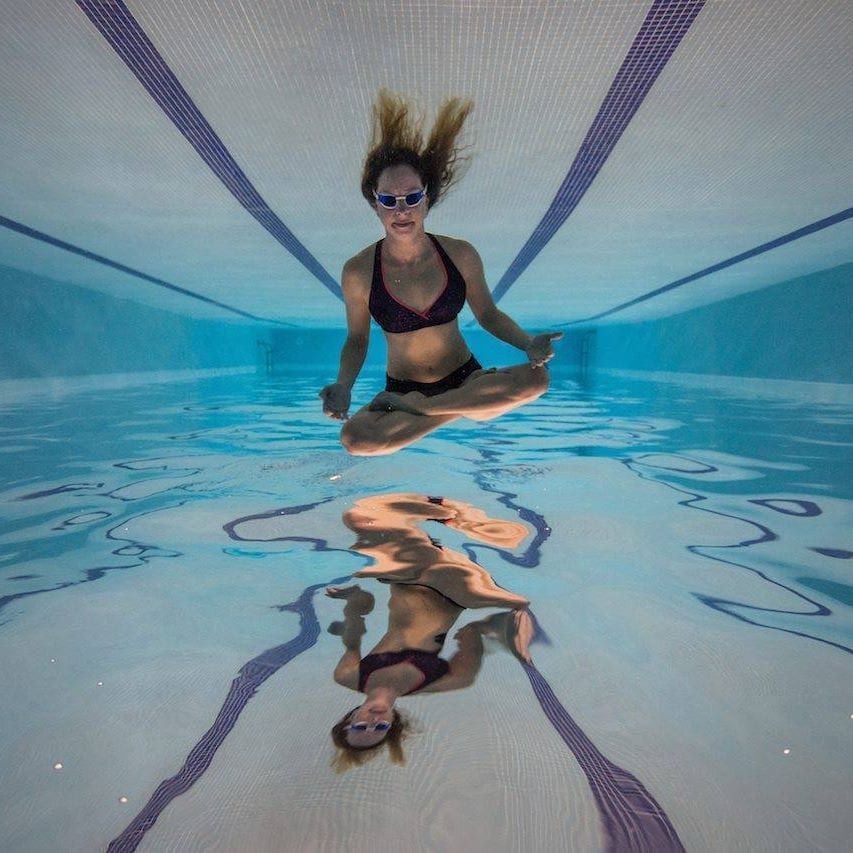
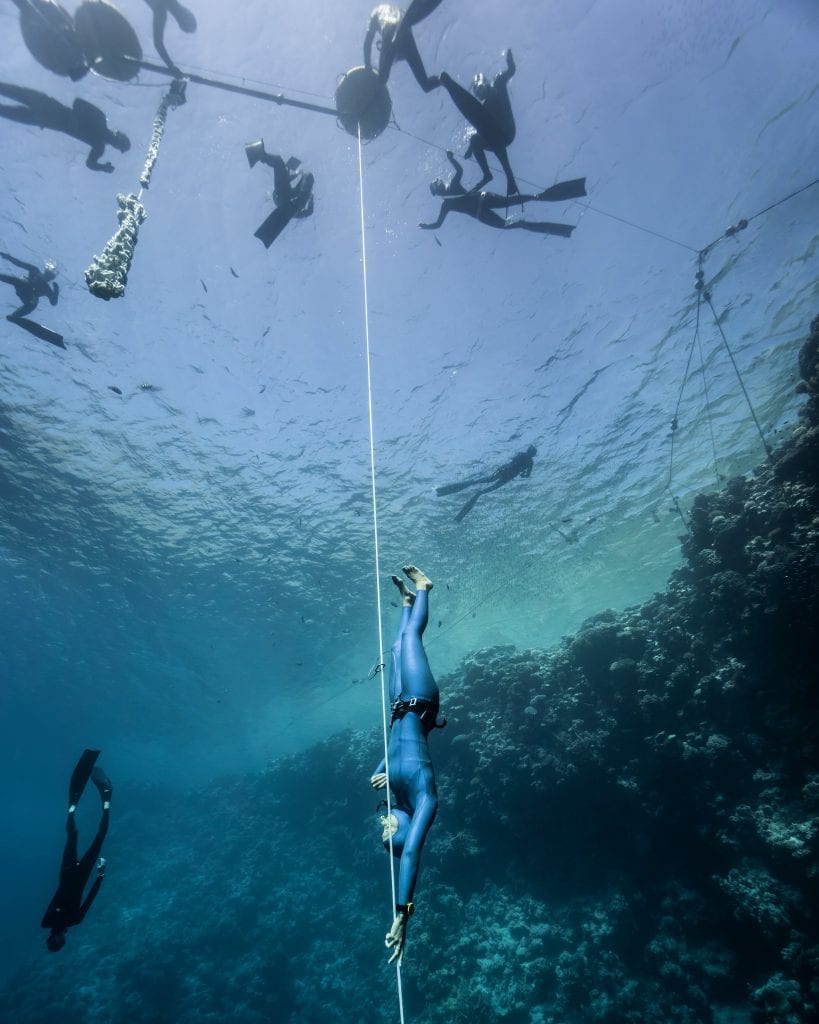
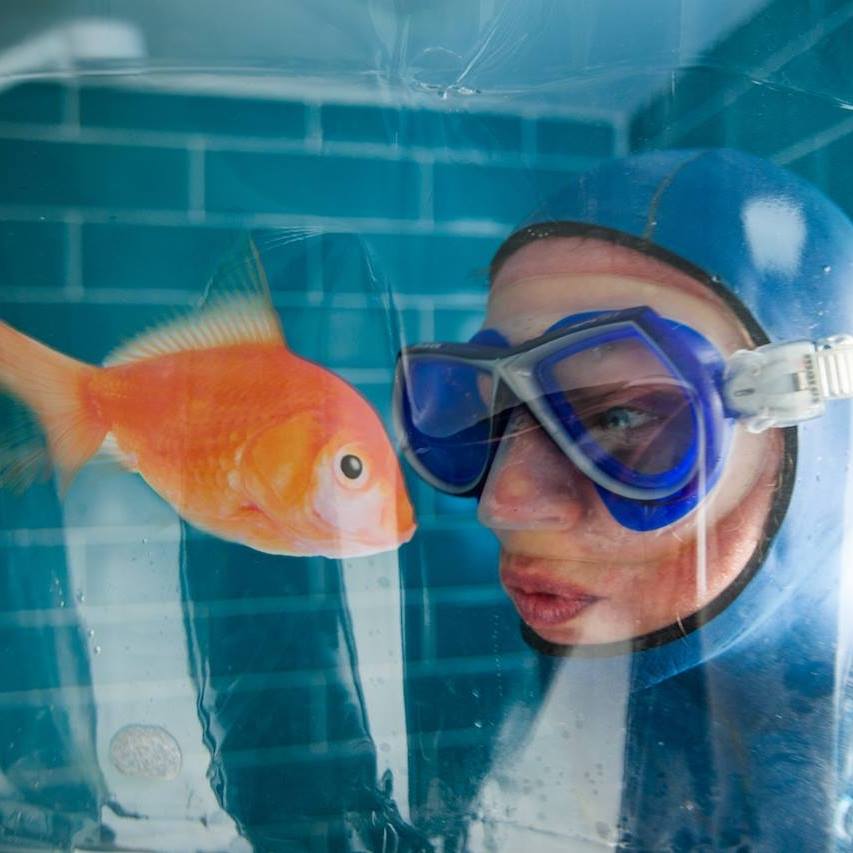


Leave a Reply